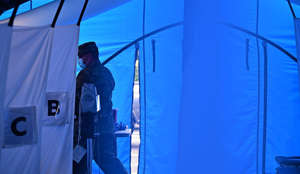
Experts are split on whether the waning delta surge will be the last major COVID-19 wave to strike the U.S., as Americans grow eager for the pandemic to end after 19 months.
The vaccination rate and decreasing cases in most states have provided a ray of hope that the pandemic could be winding down after its final large wave, some experts say.
But other public health experts caution the unpredictability of the virus suggests another surge could still happen as the country braces for winter — which led to skyrocketing cases, deaths and hospitalizations last year.
Nicholas Reich, a professor of biostatistics at the University of Massachusetts Amherst, said declaring there won’t be another major wave after delta “feels like” a “premature” and “bold” statement.
“Is there a chance? Sure, but I feel like if there’s one thing we’ve learned from this, it’s that there’s a lot more sort of uncertainty and randomness … in COVID then we’ve given it credit for so far,” he said.
Some experts, including Reich, pointed out that factors such as the potential development of variants and the unknown endurance of immunity after infection and vaccination could spark larger-scale rises in COVID-19 cases after the country has seen a national decline.
The downturn in cases comes after the delta strain fueled a spike, reaching a seven-day average of more than 175,000 daily cases in mid-September. But on Thursday, that average dropped below 100,000 for the first time since Aug. 4, according to data from The New York Times.
Overall, 39 states have seen their seven-day averages of COVID-19 cases fall within the past two weeks. Despite these drops in cases, COVID-19 is not eliminated and “many hundreds of thousands of people are still gonna get infected” as the pandemic continues, Reich said.
While COVID-19 numbers are moving “in the right direction,” some areas of the country, including Alaska and West Virginia, are still “very much in the midst of the delta wave,” said Leana Wen, an emergency physician and public health professor at George Washington University.
“I’m very concerned about people becoming complacent because they think that the delta wave is passing us,” she said. “We have seen this happen before, where there is a rise in the number of cases, then a decline, and then people let down their guard. And as a result, we plateau at a very high level of cases. That’s unacceptable.”
The approaching winter season also makes it difficult to forecast future COVID-19 trends, as coronaviruses can more easily spread in colder weather and in indoor spaces. Last winter, the U.S. saw its highest surge of cases, hospitalizations and deaths amid holiday gatherings held before vaccines became widely available.
Christopher Murray, the director of the Institute for Health Metrics and Evaluation at the University of Washington, said he expects cases to increase in the winter after bottoming out in October, but that it is likely to be lower than the delta surge.
“I think some people will be surprised that it doesn’t just keep going away, and … that doesn’t seem very likely,” he said.
Wen of George Washington University said having just 56.2 percent of the total U.S. population fully vaccinated and fewer restrictions than last year leaves it uncertain that the delta wave could be the U.S.’s final major COVID-19 surge.
“I don’t know how we could possibly say that considering we don’t know what’s going to come our way,” Wen said.
“I’m not sure how we can know for certain that the level of protection we have nailed through vaccination is sufficient,” she said, adding she’s hopeful the end is “on the horizon” with children’s vaccines, oral treatment and more testing.
Others, including former Food and Drug Administration (FDA) commissioner Scott Gottlieb, took a more optimistic stance, anticipating that cases won’t rise to the summer delta levels again.
“Barring something unexpected, I’m of the opinion that this is the last major wave of infection,” Gottlieb told The New York Times this week.
Amesh Adalja, a senior scholar at the Johns Hopkins University Center for Health Security, told MSNBC on Friday that any rise in winter cases will likely be “more decoupled from hospitalizations and deaths” due to the increased immunity due to vaccines and infections.
“Many more people have been vaccinated, so many more people have natural immunity from this big delta wave and unfortunately so many people have died that we probably won’t see peaks that are anything like we saw in the past, especially when it comes to what matters which is hospitalization, serious disease and death,” he said.
“I think delta was hopefully the worst that this virus can throw at us,” he added.
David Dowdy, an associate professor of epidemiology at the Johns Hopkins Bloomberg School of Public Health, said he thinks it’s “unlikely” that the U.S. will endure another COVID-19 wave “to the level” of the summer delta and previous winter surges.
With the vaccination level rising and a “fair amount” of the unvaccinated getting infected, Americans’ immunity is “higher now than it’s ever been,” he said.
The emergence of a new variant could potentially threaten that immunity if the strain evades the vaccines. But Dowdy said he doesn’t expect that in the short-term, as delta has reigned as the dominant variant worldwide for months without another strain usurping it.
“I think anyone who says that they can predict the future of this pandemic is probably lying to you,” Dowdy said. “But I think we have a lot of reasons to be optimistic that we will not see another massive wave the way that we have seen so far.”
Via The Hill
